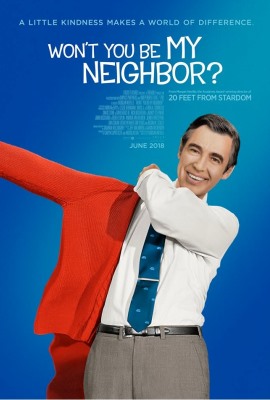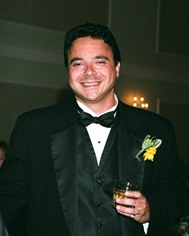 If, like me, you never watched “Mister Rogers’ Neighborhood” because you found his demeanor creepy, you’ll be all-the-more impressed with Morgan Neville’s “Won’t You Be My Neighbor?”- a documentary that enlightens your understanding of what made Fred Rogers an admirable entity in the formative years of millions of people.
If, like me, you never watched “Mister Rogers’ Neighborhood” because you found his demeanor creepy, you’ll be all-the-more impressed with Morgan Neville’s “Won’t You Be My Neighbor?”- a documentary that enlightens your understanding of what made Fred Rogers an admirable entity in the formative years of millions of people.
As a child, whenever I strayed from “Sesame Street” into “Mister Rogers’ Neighborhood,” my stay didn’t last very long: finding myself in clean-cut Rogers’ foyer as he explained in a sing-songy voice that it’s a beautiful day in his neighborhood while he casually got comfortable sliding into sneakers and getting a cardigan out of his closet just shouted “Stranger Danger” to me. In fact, even after seeing Neville’s film as an adult, Rogers’ slow-speaking cadence does to me what Hannibal Lecter’s voice did to Clarice Starling. But the beauty of “Won’t You Be My Neighbor?” and what makes my Lecter comparison legitimate is how the film demonstrates Fred Rogers’ hypnotic hold on impressionable young minds over the course of his 32 televised years. Thankfully, Rogers’ intentions were good.
Through taped interviews of Fred Rogers, who died 15 years ago, and interviews with family, friends and colleagues, the film allows us insight into Rogers that explains his m.o.: holding steadfast to Christ’s belief that people should love each other, Rogers earnestly wanted to give children guidance through a turbulent world (neatly displayed in the film’s open with Rogers explaining this idea through playing piano/talking about music modulations mirroring life). Upon seeing television, specifically kids’ shows, Rogers reached an epiphany: he dropped out of seminary school and decided to use TV as his pulpit, producing a kid’s show on WQED in Pittsburgh. Employing puppets out of necessity to compensate for a cheap production budget, Rogers found his voice by wanting to show kids that life wasn’t, as Rogers stated, “all clowns and balloons.” With his show debuting in February 1968, Rogers directly addressed the Vietnam War by enacting a similar conflict in his show’s ‘Land of Make-Believe’ segment with puppets learning the only answer is peace. Why do this? Fred Rogers never talked down to children and, if they saw news broadcast war footage, he wanted to explain the crisis to them.
Continuing this surprisingly admirable trait in the climate of the late-‘60s, Rogers addressed any unsettling social topic to quell a kid’s curiosity: three months into his show’s run, Robert Kennedy was shot and killed; Rogers had a hand-puppet named Daniel ask his human counterpart to explain the meaning of ‘assassination.’ Even racism was addressed with a plea for tolerance: Rogers, soaking his feet in a wading pool, asked an African-American cast member to join him on-screen at a time when black youths swimming in a pool were subjected to whites throwing chemical cleaning solutions at them.
In addition to showing his forthright approach, “Won’t You Be My Neighbor?” displays Rogers’ aforementioned hypnotic hold. Using a clip from Rogers’ appearance on Tom Snyder’s late-‘70s, late night talk-show “Tomorrow,” we see Snyder, notorious for asking guests frank and jarringly candid questions, come under Rogers’ spell after trying to catch Rogers off-balance. After posing a question to Rogers that today would be deemed politically incorrect, director Neville cuts to the interview’s conclusion: Snyder engaged with a hand-puppet Rogers holds inches from Snyder’s face; Snyder, embarrassingly looking away, saying “That’s great”(falling under Rogers’ charm).
What was Rogers’ secret? How could he persuade the pundits? The answer is elegantly presented in the film’s closing minutes, with Rogers giving a college commencement speech and asking a question that director Neville smartly shows the family, friends and colleagues in his film mentally asking themselves. As you watch them ponder the answer, you’ll ponder it too. When you do, you’ll “get it”: not only “Mister Rogers’ Neighborhood’s” appeal to children but the message Fred Rogers used his life to convey- it’s an intelligent, insightful moment that shows the effectiveness of this documentary
“Won’t You Be My Neighbor?” does exactly what a documentary should- it enlightens as it informs. By shedding light on Fred Rogers’ work and showing the relevance and resonance of his message, director Morgan Neville shows why he won an Oscar for his 2013 documentary “20 Feet from Stardom:” he illuminates the unseen. That’s what makes “Neighbor” worth the watch.
